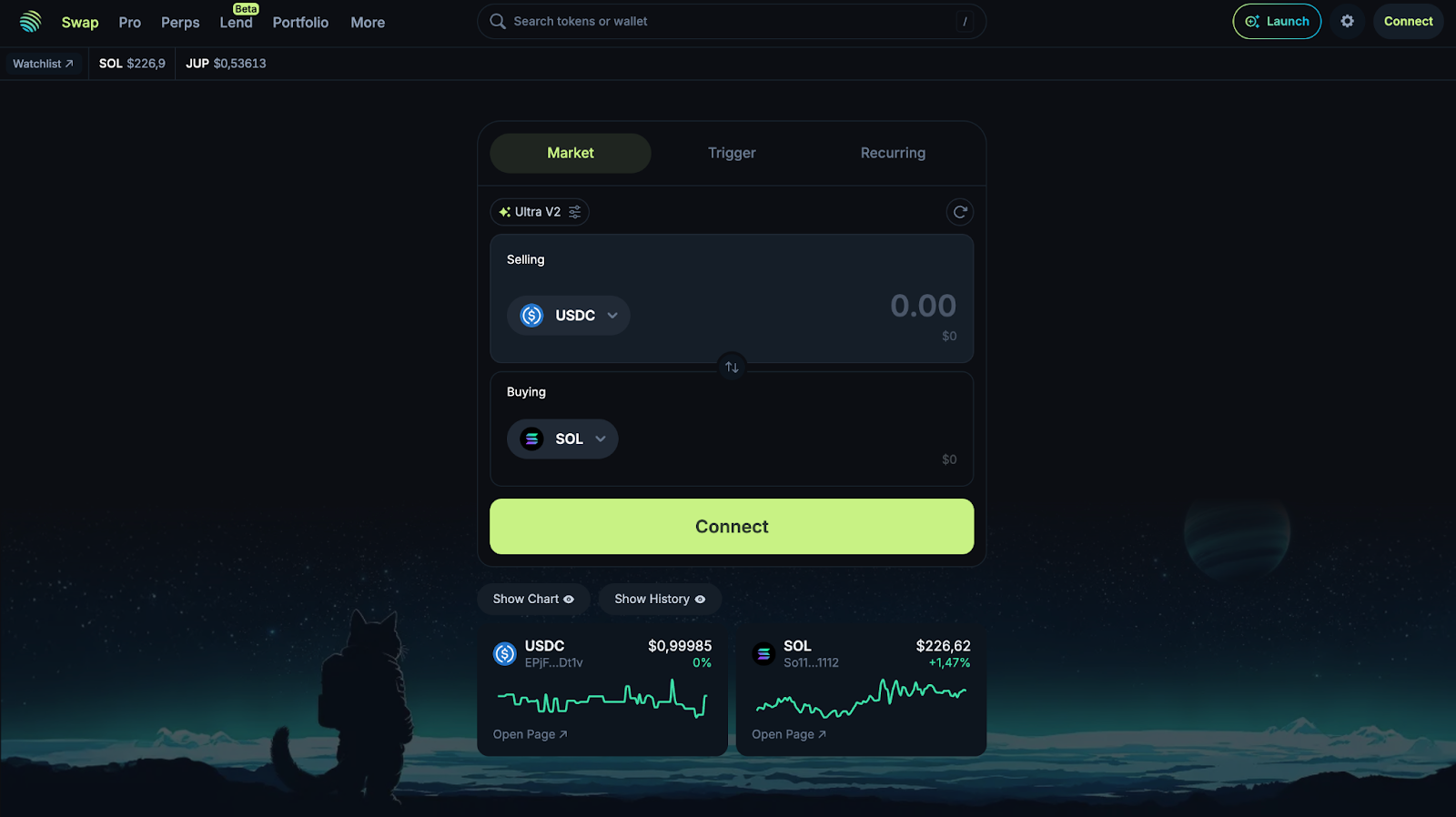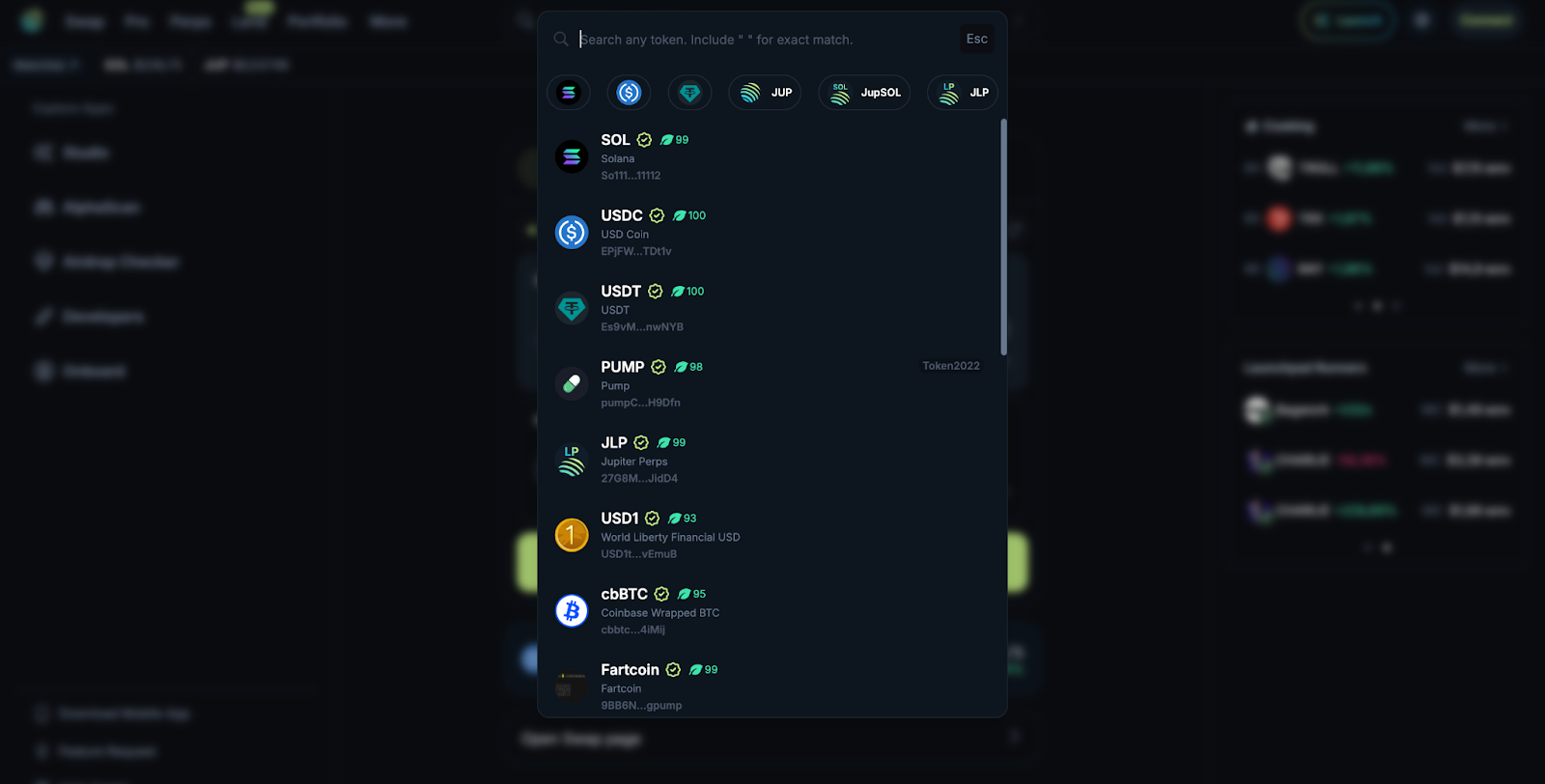If you’ve traded on Solana, there’s a good chance you’ve run into Jupiter. When I started trading on Solana, I quickly noticed most people recommended Jupiter for finding the best rates and low slippage. It’s where I usually go when I want a quick, competitive swap. Jupiter takes care of the complicated stuff behind the scenes, letting you focus on what and how much you want to swap, not where you should do it.
Jupiter pulls liquidity from a growing list of Solana DEXs, using smart routing and advanced order types to create a seamless experience. This has made Jupiter a key part of the Solana DeFi scene.
What is Jupiter Exchange?
Jupiter is much more than a standard Solana DEX. As a leading Jupiter crypto exchange, it aggregates a huge range of DEXs and liquidity pools at once, routing your trades through the most efficient path available. Launched in late 2021, Jupiter quickly became an essential tool as Solana’s ecosystem took off.
What makes Jupiter stand out is its powerful routing engine. It constantly scans all available venues and price quotes in real time, ensuring users get the best possible deal often by splitting your order across several pools for better fills.

How Solana and Jupiter exchanges are related
Jupiter is built for Solana’s unique speed and ultra-low transaction costs. The network’s fast block times (around 400 ms) and sub-cent fees allow Jupiter to route and execute trades quickly, even during peak times. Because of this, Jupiter can try multiple routes, split large orders, and keep costs to a minimum.
This synergy is a big reason why Jupiter is the default liquidity hub on Solana. Many wallets and dApps plug into Jupiter’s APIs to provide in-app swaps with great prices. Phantom is just one example.
Supported tokens and markets
Jupiter supports thousands of SPL tokens, from major assets like SOL and USDC to new memecoins and experimental projects. The team works hard to maintain broad support for the SPL standard, so new tokens often become available for trading almost instantly.
Since Jupiter aggregates across major Solana DEXs such as Raydium, Orca, Meteora, Phoenix/OpenBook, and more, the exact trading pairs depend on the available pools. As new pools launch, Jupiter’s router picks them up automatically, giving users access to fresh liquidity and better trading options.

Jupiter exchange features
Jupiter is more than just a price aggregator. It’s packed with features for every kind of trader.
Instant swaps
One-click token swaps with Ultra mode (smart defaults) or Manual mode (full control). Real-time slippage and route previews help you see what you’re getting.
Pro / Alpha tools
The Pro interface offers advanced data and analytics. AlphaScan lets active traders monitor liquidity and price movements in detail.
Trigger orders (Limit)
Set a target price and let Jupiter’s off-chain keepers execute your trade automatically when conditions are met.
Recurring (DCA)
Automate regular purchases within a chosen price range ideal for dollar-cost averaging. There’s a small 0.1% fee per completed DCA order.
Perpetuals & JLP
Trade on-chain perpetual contracts (perps) with a 0.06% base fee. The JLP pool acts as a counterparty for perps.
Routing algorithm
Jupiter’s heart is its custom routing engine, Metis, a version of the Bellman-Ford algorithm designed for DeFi. Metis is all about speed, reliability, and minimizing slippage, even under network congestion. It evaluates price, liquidity depth, slippage, and fees across venues, and can split trades across multiple pools, such as Orca and Raydium, in one go.
This approach usually means better pricing and higher fill rates than trading on just one DEX.
Smart contracts
Many new users ask, “Is Jupiter Exchange legit?”. Jupiter’s swap and perpetual systems run on audited smart contracts. Independent firm Offside Labs reviewed both the Aggregator (April 2024) and Perpetuals (March 2024), publishing their findings and fixes. Combined with Solana’s program model and standard wallet permissions, this forms the backbone of the Jupiter decentralized exchange setup. You always control your funds, signing every transaction yourself.
User interface and experience
In my view, Jupiter nails the balance between professional and user-friendly. Ultra Mode keeps it simple, handling slippage and cost optimization automatically. Manual Mode unlocks more control, like setting priority fees or using MEV protection via Jito.
Jupiter’s UI makes it easy to preview routes, see warnings about risky tokens or price impact, and connect wallets like Phantom, Solflare, Backpack, or any compatible Jupiter wallet with a click. Many wallets even use Jupiter’s routing under the hood, making it feel seamless no matter where you start.
Security and trust
Jupiter takes security seriously:
- Audits: Major contracts are audited by Offside Labs, and the reports are public.
- Non-Custodial: You control your wallet and funds at all times. Jupiter never holds user deposits.
- Execution Hygiene: Advanced settings offer Jito routing for MEV protection and dynamic priority fees.
- Safety UI: The interface gives clear warnings about token risk and price impact.
Of course, no DeFi platform is perfect or completely safe. There’s always some risk, but Jupiter’s public audits and the clear documentation gave me more peace of mind than most alternatives.
Jupiter exchange fees explained
Jupiter keeps its fee structure transparent:
- Spot Swaps:
- Recurring Buys (DCA): 0.1% platform fee on each completed order.
- Trigger Orders: Platform fee is shown in the summary, and an off-chain keeper covers transaction fees.
- Perpetuals: 0.06% base taker fee.
Compared to Uniswap v3 (which charges 0.01–1% plus high Ethereum gas fees) and 1inch (which still charges DEX/gas fees), Jupiter’s pricing is tough to beat, especially for frequent, smaller trades.
The Jupiter token ($JUP)
$JUP is Jupiter’s governance and community token, with a fixed supply of 10 billion. The first 1.35 billion entered circulation in January 2024, including 1 billion distributed through the initial Jupiter Exchange airdrop. Ongoing emissions support community, ecosystem growth, and liquidity.
Token holders can stake $JUP to vote on protocol changes and participate in working groups. The team publishes transparency reports showing how the protocol generates revenue (from perps, swaps, DCA, etc.), and some on-chain income goes to the Litterbox contract to buy $JUP for the community.
How to use Jupiter exchange (step-by-step)
Getting started with Jupiter is straightforward, whether you’re a beginner or seasoned trader:
- Connect your wallet: Go to jup.ag and connect Phantom, Solflare, Backpack, or other wallets.

- Choose tokens: Pick what you want to swap and receive. Jupiter will auto-quote the best route.
- Select a mode: Ultra Mode is great for most users, as it automatically handles slippage and priority fees with a typical fee between 0% and 0.1%. If you want more control over your trades, Manual Mode lets you adjust advanced settings yourself and charges no Jupiter fee.
- Review & Swap: Preview the route, check the expected output and price impact, and approve in your wallet.
Advanced orders
- Trigger orders: Go to jup.ag/trigger, set your target price and expiry.
- Recurring buys (DCA): Head to jup.ag/recurring to schedule regular buys.
- Perpetuals: Visit jup.ag/perps for leverage trading.
Pros and cons of Jupiter exchange
Like any platform, Jupiter comes with its own strengths and trade-offs. Here’s a quick rundown to help you decide if it’s the right fit for your Solana trading needs:
Pros
- Best execution and deep liquidity across Solana DEXs.
- Low fees, especially in Manual mode.
- Advanced features like trigger/limit orders, recurring buys, and perps.
- Audited smart contracts, seamless wallet integrations, and transparent operations.
Cons
- Solana-only: No cross-chain swaps.
- Ultra Mode’s 0.1% fee may matter for high-frequency traders; Manual mode requires more attention.
- Long-tail tokens on Solana can be risky. Always check warnings and do your own research.
Alternatives to Jupiter exchange
Here’s how Jupiter stacks up versus a few common choices:
Conclusion
Having used Jupiter regularly, sometimes for a dozen swaps in a single week, I can see why so many Solana users consider it essential. For me, Jupiter has become my starting point whenever I want the best execution on Solana. It continues to impress with its combination of deep liquidity, smart routing, and a user-friendly interface.
I appreciate how Jupiter caters to both beginners and experienced traders. I started with Ultra mode because I didn’t want to mess with settings, but eventually tried Manual for more control. The extra features, like trigger orders, did take me a bit of trial and error to get comfortable with, but the learning curve wasn’t steep. Connecting a wallet like Phantom only takes a few seconds, and in my case, I was swapping tokens within minutes of landing on the site.
Security and transparency are also big positives for me. Jupiter’s non-custodial design and audited smart contracts offer peace of mind, and the platform is upfront about fees, which are among the lowest in the industry.
While no platform is perfect, and you still need to pay attention to token risks. For most of my Solana swaps, I end up defaulting to Jupiter simply because it’s fast, covers nearly every token I need, and I haven’t run into major issues so far. If you’re trading on this network, while I generally prefer Jupiter, I do occasionally look elsewhere if I need a cross-chain swap or want to compare liquidity on a very new token.

Disclaimer: All materials on this site are for informational purposes only. None of the material should be interpreted as investment advice. Please note that despite the nature of much of the material created and hosted on this website, HODL FM is not a financial reference resource, and the opinions of authors and other contributors are their own and should not be taken as financial advice. If you require advice. HODL FM strongly recommends contacting a qualified industry professional.





